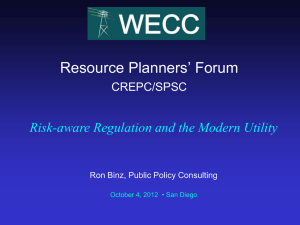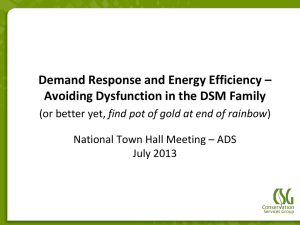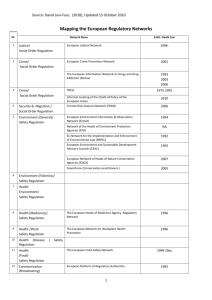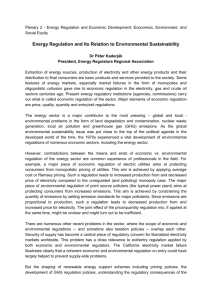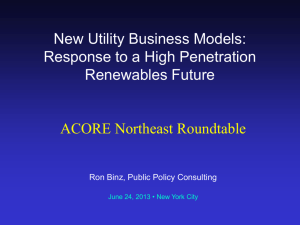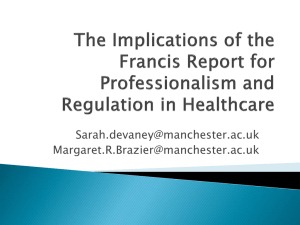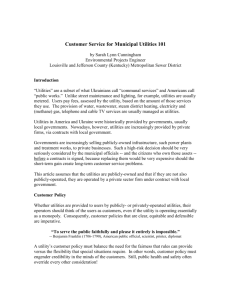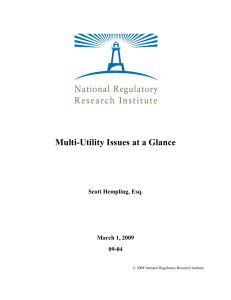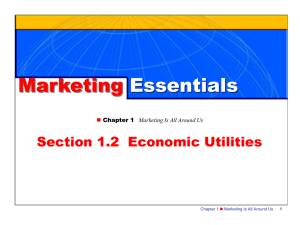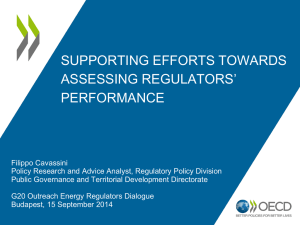Risk-aware Regulation and the Modern Utility
advertisement
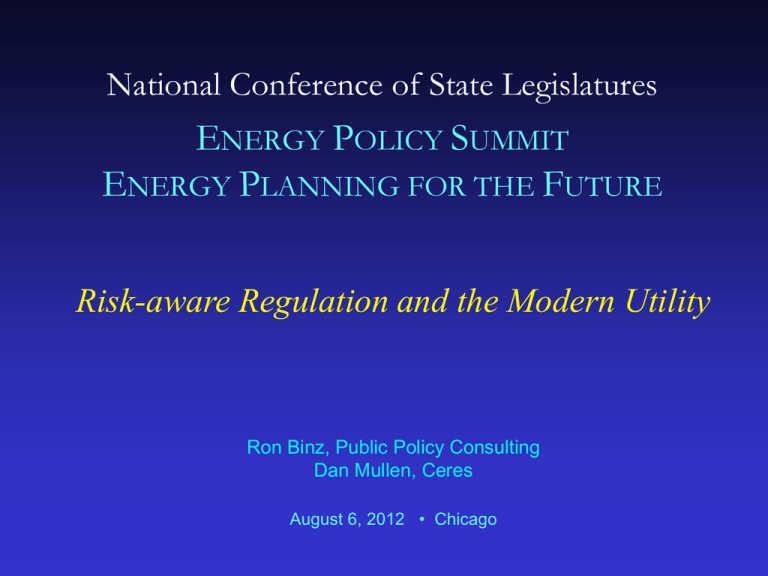
National Conference of State Legislatures ENERGY POLICY SUMMIT ENERGY PLANNING FOR THE FUTURE Risk-aware Regulation and the Modern Utility Ron Binz, Public Policy Consulting Dan Mullen, Ceres August 6, 2012 • Chicago Ron Binz -Public Policy Consulting -Former Colorado PUC Chairman -Univ of Colorado; St. Louis University -Makes wine, beer, cheese and pickles rbinz@rbinz.com Dan Mullen -Ceres -Energy efficiency and climate -Stanford University -Plays guitar well and soccer better mullen@ceres.org • Authors – – – – Ron Binz Richard Sedano Denise Furey Dan Mullen Available at www.ceres.org High Stakes • US power industry is entering a “build cycle” with much higher investment than in recent history – Brattle Group estimates $2 trillion by 2030 • Challenges – Aging infrastructure – New transmission requirements – Air and water regulation much stronger – Demand side and smart grid – Uncertain economy – Financial metrics less forgiving than in 1980s The US generation fleet is aging US Electric IOUs Rating History 1970 – 2010 4% AA AA AA A 22% BBB 46% BBB- 27% A AA A A A BBB BBB BBB 1% Source: Standard & Poor’s, Macquarie Capital The Key Question for Regulators How do we ensure that $2 trillion is spent wisely? A Catalog of Investment Risk • Cost-related – – – – – – – – • Time-related Scoring considers risks from Construction cost overruns – Construction delays Capital availability Changing markets – Construction –cost Operational surprises – Environmental regulations – Fuel and Operating cost Fuel cost escalation – Changes in load “Bet the company” investments – Technology advancement – New Regulation Management imprudences – Catastrophe Resources limited – Carbon Price – Contingent projects Consumer reaction to rates – Government policies – Water Constraints – Capital Shock – Planning Cost Risk Seven Essential Strategies for Risk-Aware Regulation • • • • • • • Diversify utility supply Utilize robust planning processes Employ transparent ratemaking practice Use financial and physical hedges Hold utilities accountable Practice active, “legislative” regulation Reform, re-invent ratemaking policies Rewards for Sound Decision-making • • • • • • For consumers: keep more $$, quality For utilities: corporate health, predictability For investors: safety, value, expectations For employees: safety and welfare, pride For the regulatory process: public confidence For society: spending precious capital wisely Utilities 2020 • Foundation funded • Run by two former state regulators • Advised by board of experts • Goal: to explore new business models and advocate new regulatory models to enable new utility business models to evolve. • Methods: – Interviews with utility CEOs and leading states regulators – Evaluations of other systems here and abroad – Dialogues with CEOs and commissioners • Preliminary conclusions: – Regulation must change significantly – We’re not rewarding utilities for desired behavior – Utilities have little incentive for innovation, firm level efficiency – Utilities want clearer, more consistent direction Conclusions • Operating and regulating utilities will get more challenging, with more risk • New business models, regulatory paradigms are needed • Affirmative risk management can help avoid expensive mistakes • Investors are more vulnerable in this build cycle • Energy efficiency performs well in risk-aware regulation • Risk shifting is not risk minimization • Not all “credit positive” cost recovery mechanisms are sustainable policies • Regulators should strive to be informed, active, consistent, curious and courageous Take-Aways for Legislators • The utility business model is changing; regulation must also change. • There is much at stake; it’ll take good regulators • To be effective, regulators need the right tools – IRP authority – EE & DR authority – Budget flexibility – The right kind of staffing • Regulators need to be more than judges; they must also operate in “legislative mode.”
